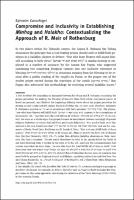Please use this identifier to cite or link to this item:
https://hdl.handle.net/20.500.12202/8483| Title: | Compromise and Inclusivity in Establishing Minhag and Halakha: Contextualizing the Approach of R. Meir of Rothenburg |
| Authors: | Kanarfogel, Ephraim 0000-0002-7539-7802 |
| Issue Date: | 2019 |
| Publisher: | Berlin: de Gruyter |
| Citation: | Kanarfogel, E. (2019). Compromise and Inclusivity in Establishing Minhag and Halakha: Contextualizing the Approach of R. Meir of Rothenburg. In Joseph Isaac Lifshitz, Naomi Feuchtwanger-Sarig, Simha Goldin, Jean Baumgarten and Hasia Diner (eds.), "Minhagim : custom and practice in Jewish life" (pp. 53-69). |
| Abstract: | In two places within the Talmudic corpus, the Amora R. Nahman bar Yizhaq enunciates the principle that a God-fearing person should seek to fulfill both positions in a halakhic dispute or debate: “One who fears Heaven will acquit himself according to both views” ( יר אמי ש םו י צ אדי שניהם ).¹ A similar strategy is employed in a number of instances by the Amora Rav Pappa, who suggested combining two competing liturgical variants into one inclusive statement or blessing הי לכ ךינמרי נה ו לתוי ר י)ו ה ) in situations ranging from the blessing to be recited after a public reading of the megilla on Purim, to the proper text of the modim prayer recited during the repetition of the amida מודי םדרמב)ן נ ).² Rav Pappa also advocated this methodology for resolving several halakhic issues.³ |
| Description: | Scholarly book chapter (proceedings) from "Minhagim: Custom and Practice in Jewish Life (Conference) (2012 Tel Aviv)" . |
| URI: | https://hdl.handle.net/20.500.12202/8483 |
| ISBN: | 9783110354232 |
| Appears in Collections: | Bernard Revel Graduate School of Jewish Studies (BRGS): Faculty Publications |
Files in This Item:
| File | Description | Size | Format | |
|---|---|---|---|---|
| Ephraim_Kanarfogel_Compromise_and_Inclusivity.pdf | 621.27 kB | Adobe PDF |  View/Open |
This item is licensed under a Creative Commons License

